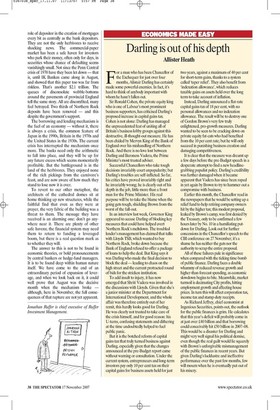Darling is out of his depth
Allister Heath For a man who has been Chancellor of the Exchequer for just over four months, Alistair Darling has certainly made some powerful enemies. In fact, it's hard to think of anybody important with whom he hasn't fallen out.
Sir Ronald Cohen, the private equity king who is one of Labour's most prominent business supporters, has criticised Darling's proposed increase in capital gains tax. Cohen is not alone: Darling has managed the unprecedented feat of uniting all of Britain's business lobby groups against this destructive, ill-thought-out measure. He has been chided by Mervyn King of the Bank of England over his mishandling of Northern Rock. And there is no love lost between Darling and Baroness Vadera, the Prime Minister's most trusted adviser.
Successful Chancellors who take tough decisions invariably court unpopularity; but Darling's troubles are self-inflicted. So far, his critics have proved invariably right and he invariably wrong; he is clearly out of his depth in the job, little more than a front man for the Prime Minister. His real purpose will be to take the blame when the going gets tough, shielding Brown from the worst of the fall-out.
In an interview last week, Governor King appeared to accuse Darling of blocking key measures that could have helped avert Northern Rock's meltdown. The troubled lender's management has claimed that talks with Lloyds TSB, which wanted to buy Northern Rock, broke down because the Bank of England refused to offer a package of loans to help the deal. But King says it was Darling who made the final decision to block the deal — leading to chaos on the high street and the current protracted round of bids for the stricken institution.
To add insult to injury, it has now emerged that Shriti Vadera was involved in the discussions with Lloyds. Given that she's a junior minister at the Department for International Development, and the whole affair was therefore entirely out of her remit, this hardly looks good for Darling. He was clearly not trusted to take care of the crisis himself, and for good reason: his U-turns, confusing statements and dithering at the time undoubtedly helped to fuel public panic.
But it is the botched reform of capital gains tax that truly turned business against Darling, especially given that the changes announced at the pre-Budget report came without warning or consultation. Under the current system, entrepreneurs and long-term investors pay only 10 per cent tax on their capital gains for business assets held for just two years, against a maximum of 40 per cent for short-term gains, thanks to a system called 'taper relief. They also benefit from 'indexation allowance', which reduces taxable gains on assets held over the long term to take account of inflation.
Instead, Darling announced a flat-rate capital gains tax of 18 per cent, with no personal allowances and no indexation allowance. The result will be to destroy one of Gordon Brown's very few truly enlightened, pro-growth measures. Darling wanted to be seen to be cracking down on private equity fat-cats who had benefited from the 10 per cent rate; but he will only succeed in punishing business creation and damaging competitiveness.
It is clear that the measure was dreamt up a few days before the pre-Budget speech in a desperate attempt to find a new headlinegrabbing populist policy. Darling's credibility was further damaged when it became apparent that Vadera has since been roped in yet again by Brown to try to hammer out a compromise with business.
Earlier this month, the Chancellor read in the newspapers that he would be setting up a relief fund to help retiring company owners hit by the higher tax; this modest proposal, leaked by Brown's camp, was first denied by the Treasury, only to be confirmed a few hours later by No. 10 in a humiliating putdown for Darling. Look out for further concessions in the Chancellor's speech to the CBI conference on 27 November; it's a shame he has neither the guts nor the authority to scrap the entire proposal.
All of these failures pale in significance when compared with the ticking time-bomb of public finance. Darling faces a double whammy of reduced revenue growth and higher-than-forecast spending, as economic slowdown begins to bite. Meanwhile, market turmoil is decimating City profits, hitting employment growth and affecting house prices. In turn this will affect corporation tax, income tax and stamp-duty receipts.
As Richard Jeffrey, chief economist at Ingenious Securities, points out, the outlook for the public finances is grim. He calculates that this year's deficit will probably come in at just over £40 billion and that borrowing could conceivably hit £50 billion in 2007-08. This would be a disaster for Darling and might very well signal his political demise, even though the real guilt would lie squarely with Brown's unforgivable mismanagement of the public finances in recent years. But given Darling's lacklustre and ineffective performance over the past few months, few will mourn when he is eventually put out of his misery.




































































 Previous page
Previous page